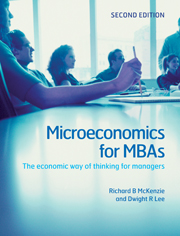Book contents
- Frontmatter
- Contents
- Preface
- How to use this book
- List of online perspectives
- List of further readings online
- List of online video modules
- Book I The market economy, overview and application
- 1 Microeconomics: a way of thinking about business
- 2 Principles of rational behavior in society and business
- 3 Competitive product markets and firm decisions
- 4 Applications of the economic way of thinking: domestic government and management policies
- 5 Applications of the economic way of thinking: international and environmental economics
- Book II Demand and production theory
- Book III Competitive and monopoly market structures
- References
- Index
1 - Microeconomics: a way of thinking about business
from Book I - The market economy, overview and application
- Frontmatter
- Contents
- Preface
- How to use this book
- List of online perspectives
- List of further readings online
- List of online video modules
- Book I The market economy, overview and application
- 1 Microeconomics: a way of thinking about business
- 2 Principles of rational behavior in society and business
- 3 Competitive product markets and firm decisions
- 4 Applications of the economic way of thinking: domestic government and management policies
- 5 Applications of the economic way of thinking: international and environmental economics
- Book II Demand and production theory
- Book III Competitive and monopoly market structures
- References
- Index
Summary
In economics in particular, education seems to be largely a matter of unlearning and “disteaching” rather than constructive action. A once famous American humorist observed that “it's not ignorance that does so much damage; it's knowin' so darn much that ain't so” … It seems that the hardest things to learn and to teach are things that everyone already knows.
Frank H. KnightThe late Frank Knight was a wise professor at the University of Chicago who realized that students beginning a study of economics, no matter the level – even those who are in advanced business programs – face a difficult task. They must learn many things in a rigorous manner that, on reflection and with experience, amount to common sense. To do that, however, they must set aside – or “unlearn” – many preconceived notions of the economy and of the course itself. The problem of “unlearning” can be especially acute for MBA students who are returning to a university after years of experience in industry. People in business rightfully focus their attention on the immediate demands of their jobs and evaluate their firms' successes and failures with reference to production schedules and accounting statements, a perspective that stands in stark contrast to the perspective developed in an economics class.
- Type
- Chapter
- Information
- Microeconomics for MBAsThe Economic Way of Thinking for Managers, pp. 3 - 40Publisher: Cambridge University PressPrint publication year: 2010



